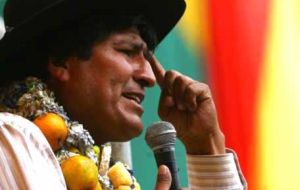MercoPress. South Atlantic News Agency
Recall referendum opinion polls ratify Bolivian president
 Bolivian president Evo Morales
Bolivian president Evo Morales Bolivian president Evo Morales is comfortably favored for ratification in the recall referendum of next August 10 with 59% support, according to the latest public opinion poll published Sunday in the capital La Paz main daily La Razón.
President Morales, vice president Alvaro García and eight governors (six from the opposition) will submit their posts to the voting booths as part of an agreement to overcome the ongoing political stand off with the opposition, which has virtually paralyzed the land locked South American country. President Morales support is particularly strong in the country's main four cities. His support was 56% last March, while disapproval dropped from 40% in March to 37% in July. The public opinion poll interviewed 1.002 people, between July 19 and 27, in the cities of La Paz, El Alto, Cochabamba and Santa Cruz. Results have a plus/minus margin error of 3 percentage points. In the city of El Alto next to the capital La Paz and one of the poorest urban areas of Bolivia, Morales support reached 90% and remains his foremost stronghold while the city of Santa Cruz, which leads the opposition, his rejection is the highest, 59%. A second public opinion reading from Gallup International, rates Morales at 4.31 in a 1 to 7 scale. Gallup's interviews were done between July 5 and 28 in Bolivia's nine provinces with an error margin of 2.27 percentage points. Two weeks ago Captura Consulting showed President Morales support standing at 49%. The main dispute between the first indigenous president of Bolivia and the opposition is over income and land distribution. The east provinces are rich in oil and gas plus farming while to the west highlands a majority of the Indian population barely manages to scratch a living. A constitutional assembly has drafted a new constitution, --pending approval--, following on Morales promises of re-distribution and strong government intervention in the economy, which is openly, and on occasions violently rejected by the provinces under opposition control. Furthermore rejection has fermented into a strong movement claiming autonomy from La Paz and the possibility of dismembering the country. In the last week of campaigning leading to the recall vote, opposition regional leaders have begun a hunger strike demanding La Paz returns oil and gas royalties which have been used to hand out a special old age pension bonus. In spite of mounting social tension President Morales and his command are strongly campaigning in favor of "the Socialist model" which a "majority of Bolivians favor". "I was looking at opinion polls among Bolivians overseas and in the country and an overwhelming majority want Socialism… If people ask for Socialism, we are going to strengthen Socialism", said Morales during a political rally with peasants in the highlands. Morales also announced the opening of universities for indigenous people to teach Aymara, Quechua and Guarani, the three main languages of Bolivian groups.




Top Comments
Disclaimer & comment rulesCommenting for this story is now closed.
If you have a Facebook account, become a fan and comment on our Facebook Page!